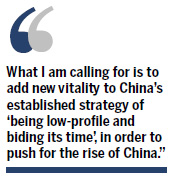China
Policy change is in order for China
By Yang Yi (China Daily)
Updated: 2010-08-16 16:45
 |
Large Medium Small |
BEIJING - China is standing at the precipice of a new phase and its international role is undergoing major changes.
First, China is transforming from a regional power to a world power and its influence is gradually spreading globally. Therefore, China's strategy and vision must evolve.
Second, China is gradually transforming from a supporting actor to a major actor internationally, a trend that became more visible after the global financial crisis pushed Beijing to center stage. But China needs to be more aware of its responsibility and any opportunities that present themselves.
Third, China's role is expanding and it needs to play its due role in many aspects such as politics, economics, culture, foreign affairs and military.

As a rising power, however, China faces more complicated challenges than any other rising power in history. The first challenge is the resurfacing of the Cold War mentality, which features a conflict between socialism and capitalism, and whether it can be eliminated. Although China has worked hard to help build a harmonious world, some Western countries regard China as a different type of country.
The second challenge is for China to fight hegemonism. The nation's adherence to peaceful development hasn't convinced the US thus far, which regards China as its biggest challenger. Washington's military drills in East Asia reflect that mentality.
The third challenge is that China's rapid development has created conflicts with other nations. Some developing countries, who are friends of China, have not been with very happy with and have begun to question China.
Under these circumstances, China must innovate its foreign affairs polices and press ahead with its diplomatic transformation.
To be specific, China must work hard in the following aspects:

First, China must fully participate in global affairs. China's interest and influence are spreading to every corner of the world and upheavals in any part of the world could affect China's interests to some degree. It is not easy for China to avoid engagement and play safe. China can no longer afford to be a bystander. Instead, it should fully participate in global affairs.
Although at present China lacks the power to set major world agenda, that power is rising and China should voice its opinions, safeguard its interests and the interests of nations that are friendly to China, and use its veto power. This could draw the ire from some nations, but China can garner their respect over time.
Second, China must respond to global affairs timely. It should not play second fiddle as it has been accustomed to doing. Instead, the nation should articulate its stances as soon as possible with regard to a global incident that affects China's major interests.
Third, China must take the initiative to influence the world. To achieve that goal, China needs to shape its strategies around the world and actively forge bilateral relations.
Fourth, China must add new wrinkles to its traditional diplomatic ideologies. In dealing with the world's major powers, China should make use of all relations in pursuit of its interests, rather than merely fight off pressure from other nations. In dealing with neighboring countries, China should expand its scope of interest instead of only forging a buffer belt on the basis of defensive strategies. In regard to the relationship with the third world nations, they are not only China's allies in the fight against hegemony, but also footholds in China's global interests.
China should not be arrogant or insolent. What I am calling for is to add new vitality to China's established strategy of "being low-profile and biding its time", in order to push for the rise of China.
The author is a rear admiral at the institute of strategic studies of the National Defense University in Beijing.
For China Daily